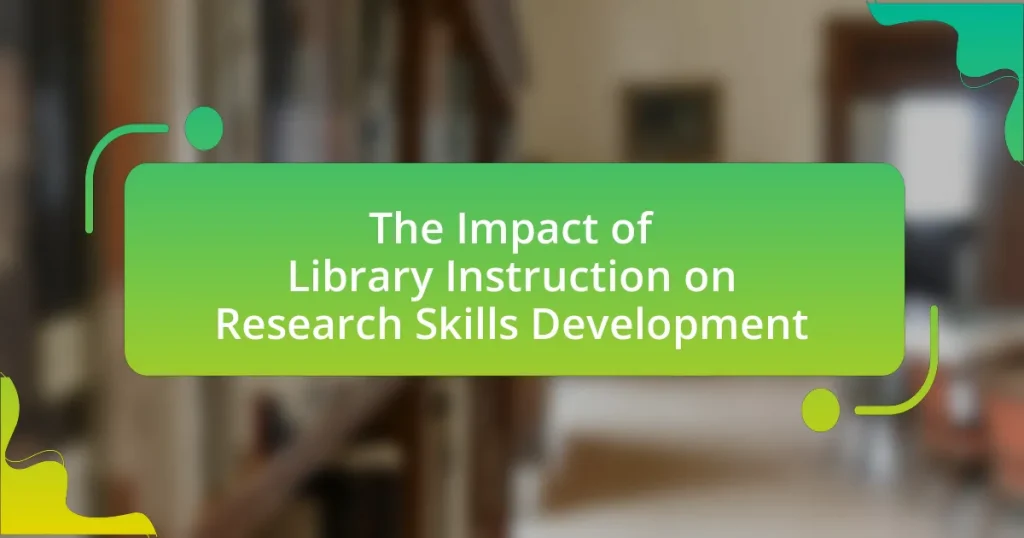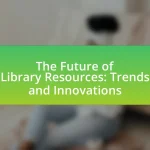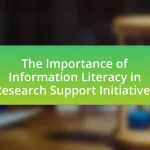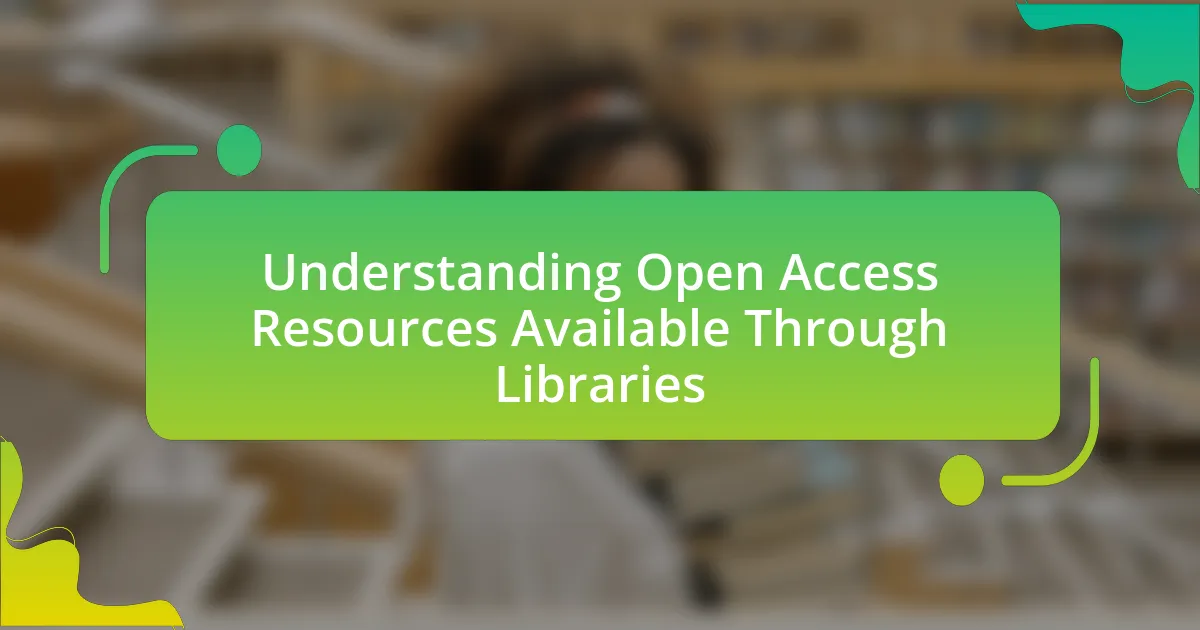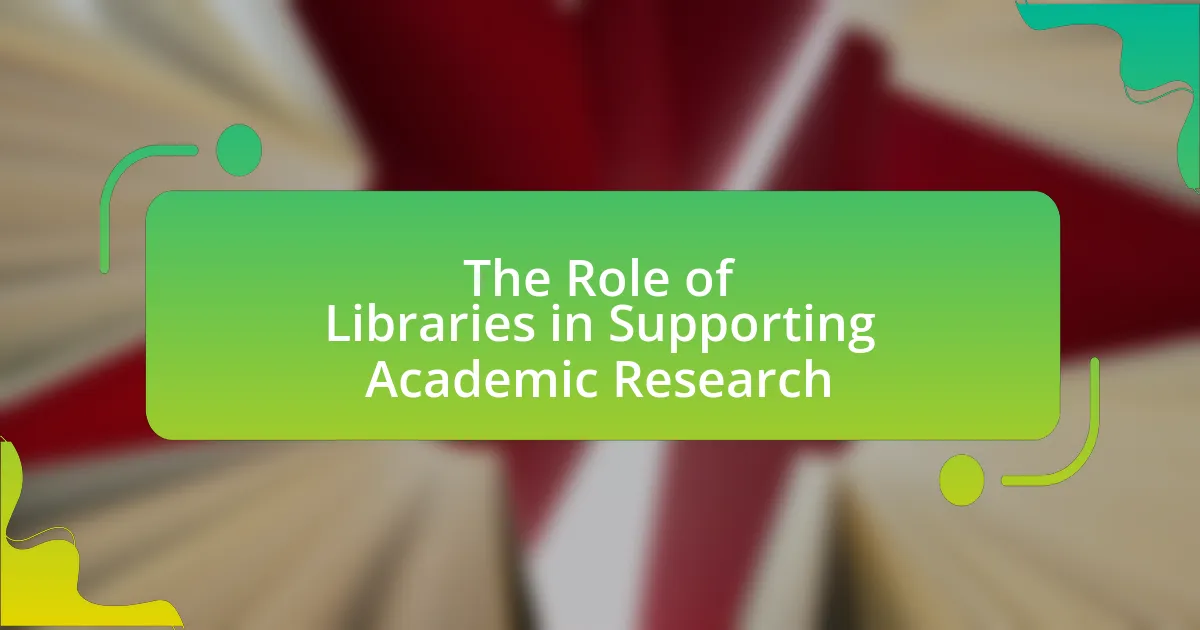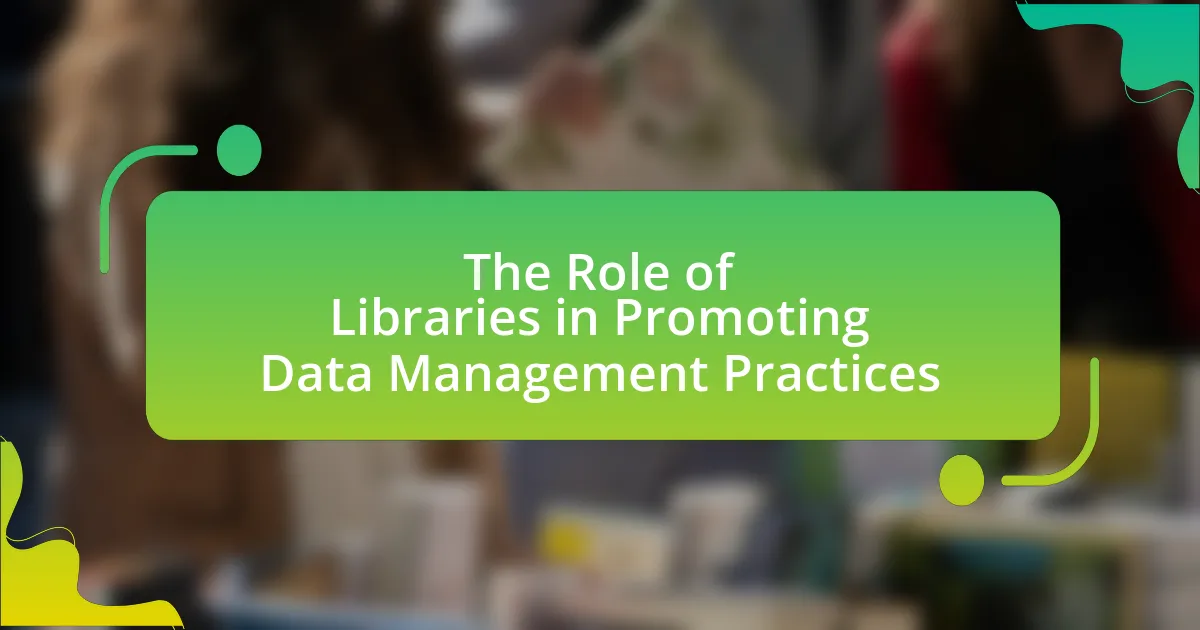Library instruction plays a crucial role in enhancing research skills development among students by providing essential information literacy competencies. Research shows that students who engage in library instruction exhibit improved abilities to locate, evaluate, and utilize information effectively, often achieving higher scores on assessments compared to those who do not receive such training. The article explores the specific research skills enhanced through library instruction, the methods employed, and the perceptions of students regarding its effectiveness. Additionally, it addresses challenges faced in library instruction, barriers to access, and strategies for improvement, emphasizing the importance of tailored instruction and active learning techniques in fostering academic success.
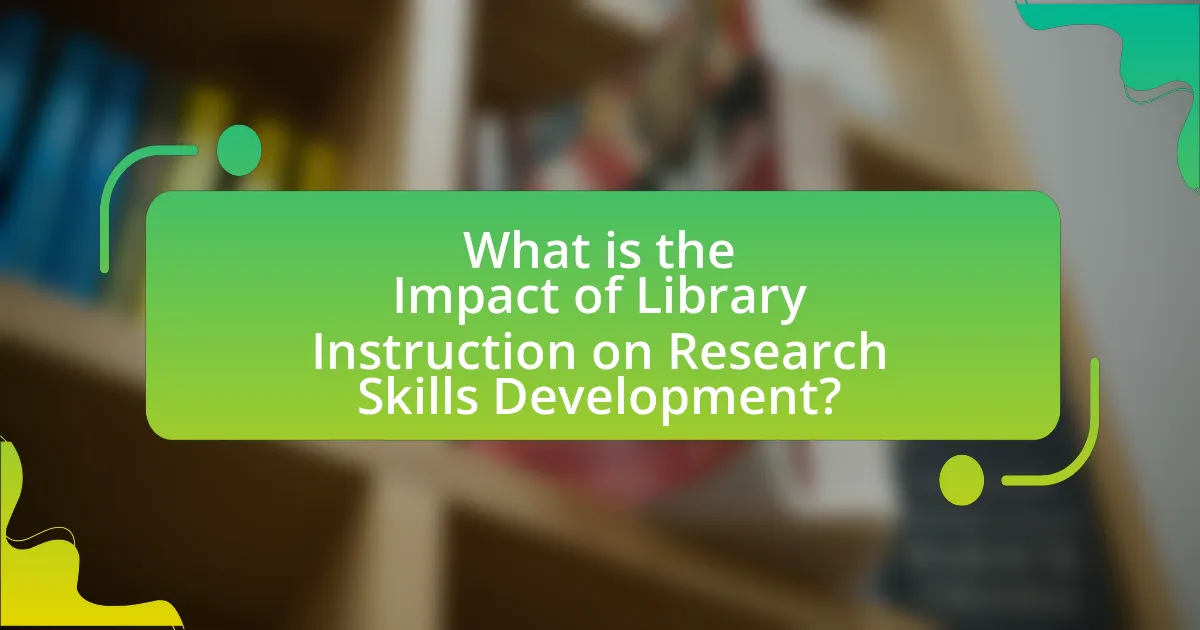
What is the Impact of Library Instruction on Research Skills Development?
Library instruction significantly enhances research skills development by equipping students with essential information literacy competencies. Research indicates that students who participate in library instruction demonstrate improved abilities to locate, evaluate, and utilize information effectively. For instance, a study published in the Journal of Academic Librarianship found that students who received targeted library instruction scored 20% higher on information literacy assessments compared to those who did not receive such instruction. This improvement is attributed to the structured guidance provided by librarians, which fosters critical thinking and effective research strategies.
How does library instruction influence research skills?
Library instruction significantly enhances research skills by equipping individuals with essential information literacy competencies. This instruction teaches users how to effectively locate, evaluate, and utilize information resources, which are critical skills in conducting thorough research. Studies have shown that students who participate in library instruction demonstrate improved abilities in identifying credible sources and applying appropriate research methodologies. For instance, a study published in the Journal of Academic Librarianship found that students who received library instruction scored 20% higher on research assignments compared to those who did not receive such training. This evidence underscores the positive correlation between library instruction and the development of robust research skills.
What specific research skills are enhanced through library instruction?
Library instruction enhances specific research skills such as information literacy, critical thinking, and effective search strategies. Information literacy involves the ability to identify, locate, evaluate, and use information effectively, which is crucial for academic success. Critical thinking skills are developed as students learn to analyze sources for credibility and relevance. Effective search strategies are taught through the use of databases and catalogs, enabling students to efficiently find and retrieve information. Studies have shown that students who receive library instruction demonstrate improved research outcomes, including higher quality citations and a better understanding of research methodologies.
How do students perceive the effectiveness of library instruction on their research skills?
Students generally perceive library instruction as effective in enhancing their research skills. Research indicates that students who participate in library instruction report increased confidence in their ability to locate and evaluate information. A study by Oakleaf (2010) found that 85% of students felt more competent in their research abilities after receiving library instruction, highlighting its positive impact on their academic performance. Additionally, students often express appreciation for the practical skills gained, such as understanding database navigation and citation management, which are crucial for successful research.
Why is library instruction important for research skills development?
Library instruction is important for research skills development because it equips individuals with the necessary tools and knowledge to effectively locate, evaluate, and utilize information. This instruction enhances critical thinking and information literacy, which are essential for academic success and informed decision-making. Studies have shown that students who receive library instruction demonstrate improved research outcomes, such as higher grades and better project quality, as they learn to navigate complex information landscapes and discern credible sources.
What role does library instruction play in academic success?
Library instruction plays a crucial role in academic success by equipping students with essential research skills necessary for effective information retrieval and critical analysis. This instruction enhances students’ ability to locate, evaluate, and utilize information efficiently, which is vital for completing assignments and conducting research. Studies have shown that students who receive library instruction demonstrate improved academic performance, as they are better prepared to navigate complex information landscapes. For instance, a study published in the Journal of Academic Librarianship found that students who participated in library instruction sessions scored significantly higher on research assignments compared to those who did not receive such training. This evidence underscores the importance of library instruction in fostering academic achievement and developing lifelong learning skills.
How does library instruction address gaps in students’ research skills?
Library instruction addresses gaps in students’ research skills by providing targeted training in information literacy, which enhances their ability to locate, evaluate, and use information effectively. This instruction often includes workshops, one-on-one consultations, and online resources that teach students how to navigate databases, assess the credibility of sources, and apply proper citation practices. Research indicates that students who participate in library instruction demonstrate improved research outcomes, such as higher grades and increased confidence in their research abilities, as evidenced by a study published in the Journal of Academic Librarianship, which found that 75% of students reported enhanced research skills after attending library workshops.
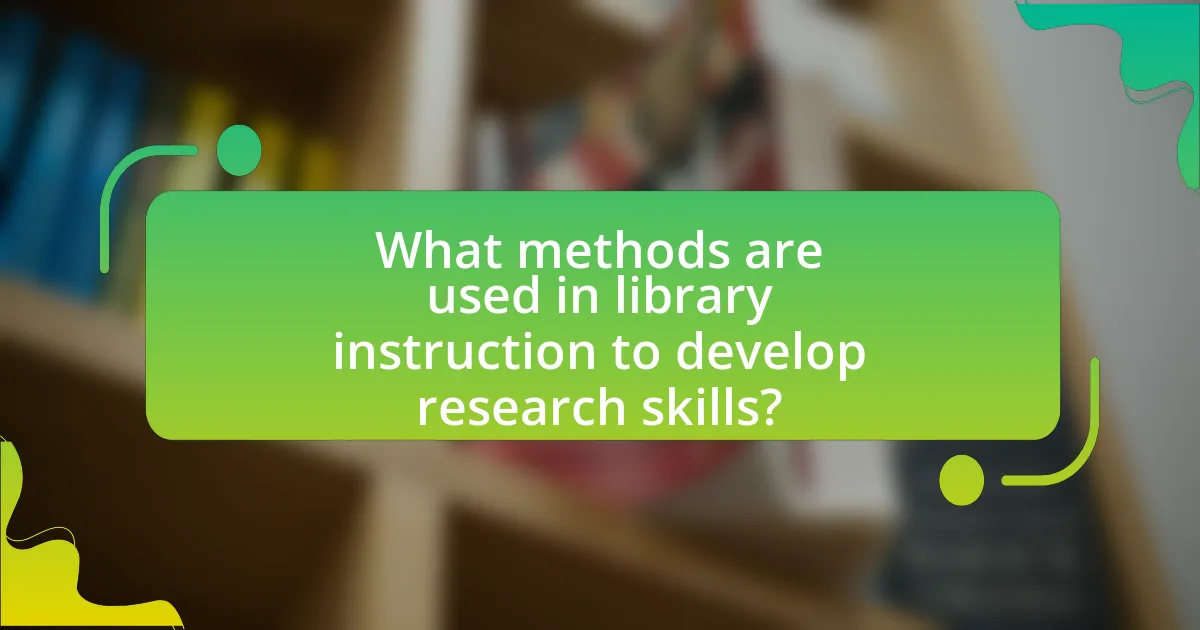
What methods are used in library instruction to develop research skills?
Library instruction employs various methods to develop research skills, including hands-on workshops, one-on-one consultations, and online tutorials. Hands-on workshops allow students to engage directly with research tools and databases, enhancing their practical skills. One-on-one consultations provide personalized guidance, helping students navigate specific research challenges and refine their strategies. Online tutorials offer flexible, self-paced learning opportunities, covering essential topics such as database searching, citation management, and evaluating sources. These methods are supported by studies indicating that active learning approaches significantly improve students’ research competencies and confidence in information literacy.
What types of library instruction are most effective?
Interactive and hands-on library instruction methods are the most effective types of library instruction. These approaches engage learners actively, allowing them to practice research skills in real-time. Studies, such as those conducted by the Association of College and Research Libraries, indicate that students who participate in interactive sessions demonstrate a higher retention of information and improved research competencies compared to those who receive traditional lecture-based instruction. Additionally, incorporating technology, such as online tutorials and digital resources, has been shown to enhance accessibility and engagement, further supporting the effectiveness of library instruction.
How do workshops compare to one-on-one instruction in developing research skills?
Workshops generally provide a broader exposure to research skills compared to one-on-one instruction, which offers personalized guidance. Workshops facilitate group learning, allowing participants to engage with diverse perspectives and collaborative problem-solving, enhancing critical thinking skills. In contrast, one-on-one instruction tailors the learning experience to the individual’s specific needs, enabling deeper exploration of particular research topics or methodologies. Research indicates that while workshops can effectively introduce foundational skills to a larger audience, personalized instruction often leads to greater retention and application of those skills in real-world scenarios. For instance, a study by the Association of College and Research Libraries found that students receiving individualized instruction demonstrated a 30% improvement in their ability to formulate research questions compared to those who attended workshops alone.
What digital tools are integrated into library instruction for research skills development?
Digital tools integrated into library instruction for research skills development include online databases, citation management software, and learning management systems. Online databases such as JSTOR and PubMed provide access to a vast array of academic resources, enabling students to conduct thorough literature reviews. Citation management software like Zotero and EndNote assists students in organizing references and generating citations accurately, which is crucial for academic integrity. Learning management systems, such as Canvas or Blackboard, facilitate the delivery of instructional content and resources, allowing for interactive learning experiences. These tools collectively enhance students’ research capabilities by providing essential resources and support throughout the research process.
How do different learning styles affect library instruction outcomes?
Different learning styles significantly influence library instruction outcomes by affecting how individuals engage with and retain information. For instance, visual learners benefit from diagrams and charts, which can enhance their understanding of library resources, while auditory learners may excel through discussions and lectures that explain research processes. Research indicates that tailoring instruction to accommodate these diverse learning styles can lead to improved retention rates and greater satisfaction among learners. A study by Pritchard and Woollard (2010) found that when library instruction aligns with students’ preferred learning styles, it enhances their ability to locate and utilize information effectively, thereby improving their overall research skills.
What strategies can be employed to accommodate diverse learning styles in library instruction?
To accommodate diverse learning styles in library instruction, educators can employ a variety of strategies such as differentiated instruction, multimodal resources, and active learning techniques. Differentiated instruction involves tailoring teaching methods to meet the varied needs of learners, which can include offering visual aids, auditory materials, and hands-on activities. Multimodal resources, such as videos, infographics, and interactive databases, cater to different preferences, ensuring that visual, auditory, and kinesthetic learners can engage effectively. Active learning techniques, including group discussions and problem-solving activities, promote engagement and allow learners to apply concepts in real-world contexts. Research indicates that these strategies enhance learning outcomes by addressing individual learning preferences, thereby improving research skills development among library users.
How can library instructors assess the effectiveness of their teaching methods?
Library instructors can assess the effectiveness of their teaching methods through a combination of student feedback, performance assessments, and observational evaluations. Student feedback can be gathered via surveys or interviews, allowing instructors to understand learners’ perceptions of the instruction and its relevance to their research skills. Performance assessments, such as pre- and post-tests, can quantitatively measure the improvement in students’ research abilities, providing concrete data on the impact of the instruction. Observational evaluations involve instructors reflecting on their teaching practices and student engagement during sessions, which can highlight areas for improvement. Research indicates that these methods collectively enhance the understanding of instructional effectiveness, as demonstrated in studies like “Assessing the Impact of Library Instruction on Student Learning” by the Association of College and Research Libraries, which emphasizes the importance of multifaceted assessment approaches.
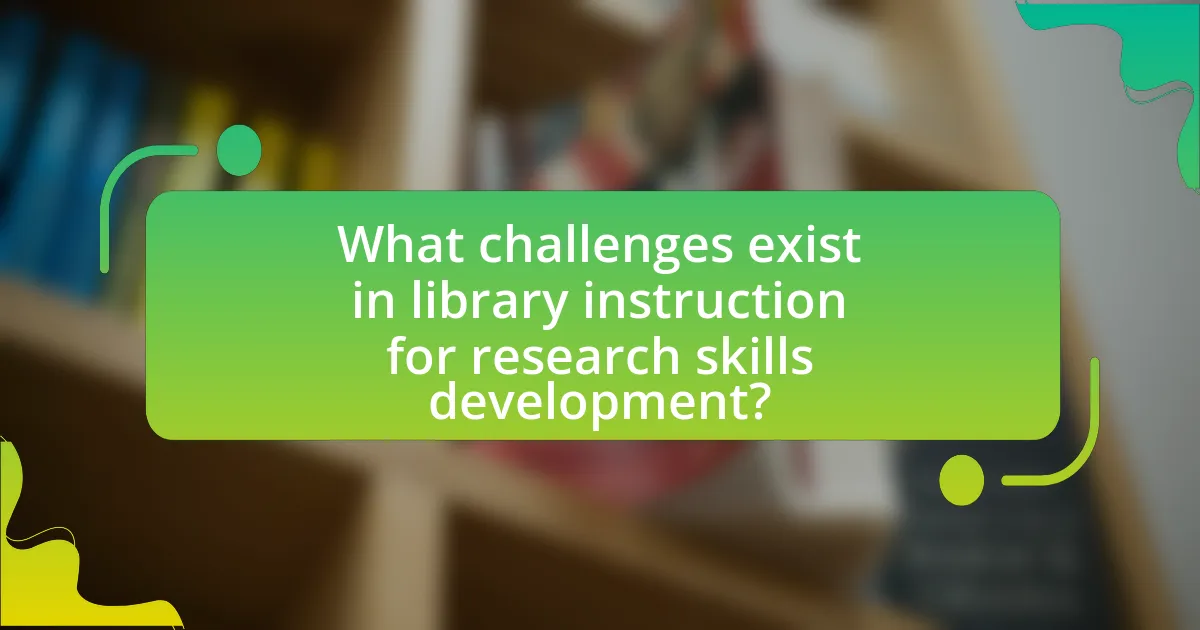
What challenges exist in library instruction for research skills development?
Challenges in library instruction for research skills development include varying levels of student engagement, limited instructional time, and the rapid evolution of information technologies. Student engagement can be inconsistent, as some learners may lack motivation or prior knowledge, making it difficult for instructors to tailor lessons effectively. Limited instructional time often restricts the depth of content that can be covered, hindering comprehensive skill development. Additionally, the fast-paced changes in digital resources and research methodologies require continuous updates to instructional materials, which can overwhelm both instructors and students. These challenges collectively impact the effectiveness of library instruction in fostering essential research skills.
What barriers do students face in accessing library instruction?
Students face several barriers in accessing library instruction, including lack of awareness, scheduling conflicts, and limited technological access. Many students are unaware of the library resources and instruction available to them, which can hinder their ability to seek help. Scheduling conflicts arise when library instruction sessions do not align with students’ class schedules, making attendance difficult. Additionally, limited access to technology, such as computers or reliable internet, can prevent students from participating in online library instruction sessions. These barriers collectively impact students’ ability to develop essential research skills.
How can libraries overcome these barriers to improve research skills development?
Libraries can overcome barriers to improve research skills development by implementing targeted instructional programs that address specific user needs. By conducting assessments to identify gaps in research skills among patrons, libraries can tailor workshops and resources that focus on critical areas such as information literacy, database navigation, and citation management. Research indicates that libraries that offer hands-on training sessions and personalized support significantly enhance users’ confidence and competence in conducting research (Association of College & Research Libraries, 2016). Additionally, integrating technology, such as online tutorials and interactive platforms, can provide flexible learning opportunities that cater to diverse learning styles, further promoting effective research skills development.
What misconceptions do students have about library resources and instruction?
Students often believe that library resources are limited to physical books and that librarians only assist with basic inquiries. This misconception overlooks the extensive range of digital resources available, such as databases, e-books, and online journals, which are crucial for comprehensive research. Additionally, many students underestimate the role of librarians, who are trained to provide advanced research support, including information literacy instruction and guidance on effective search strategies. Research indicates that students who engage with library instruction demonstrate improved research skills and greater confidence in utilizing diverse resources, highlighting the importance of understanding the full scope of library services.
How can library instruction be improved to enhance research skills?
Library instruction can be improved to enhance research skills by integrating active learning techniques and personalized instruction. Active learning, such as hands-on workshops and collaborative projects, engages students more effectively than traditional lectures, leading to better retention of research methodologies. A study by the Association of College and Research Libraries found that students who participated in active learning sessions demonstrated a 30% increase in their ability to locate and evaluate information sources. Additionally, personalized instruction tailored to individual student needs fosters a deeper understanding of research tools and resources, as evidenced by a 2019 study published in the Journal of Academic Librarianship, which reported that personalized sessions increased student confidence in research skills by 40%.
What best practices should library instructors adopt for effective teaching?
Library instructors should adopt active learning strategies for effective teaching. Active learning engages students in the learning process, enhancing their research skills and retention of information. Research indicates that students who participate in active learning demonstrate improved critical thinking and problem-solving abilities, which are essential for effective research. For instance, a study published in the Journal of Educational Psychology found that students in active learning environments scored higher on assessments compared to those in traditional lecture-based settings. Additionally, incorporating technology, such as online research tools and databases, can facilitate a more interactive learning experience, further supporting the development of research skills.
How can feedback from students shape library instruction programs?
Feedback from students can significantly shape library instruction programs by identifying specific areas for improvement and tailoring content to meet learners’ needs. When students provide insights on their experiences, preferences, and challenges, library staff can adjust instructional methods, resources, and support services accordingly. For instance, a study by the Association of College and Research Libraries found that incorporating student feedback led to enhanced engagement and improved learning outcomes in library instruction sessions. This demonstrates that actively seeking and implementing student feedback can create more effective and relevant library instruction programs, ultimately fostering better research skills development.
What practical tips can enhance the effectiveness of library instruction?
To enhance the effectiveness of library instruction, librarians should incorporate active learning techniques, such as hands-on activities and group discussions. Research indicates that active learning increases student engagement and retention of information, as demonstrated in a study by Prince (2004) published in the Journal of Engineering Education, which found that students in active learning environments performed better than those in traditional lecture settings. Additionally, tailoring instruction to meet the specific needs of the audience, using real-world examples, and integrating technology can further improve learning outcomes. These strategies not only make the instruction more relevant but also help students apply their skills in practical contexts.
